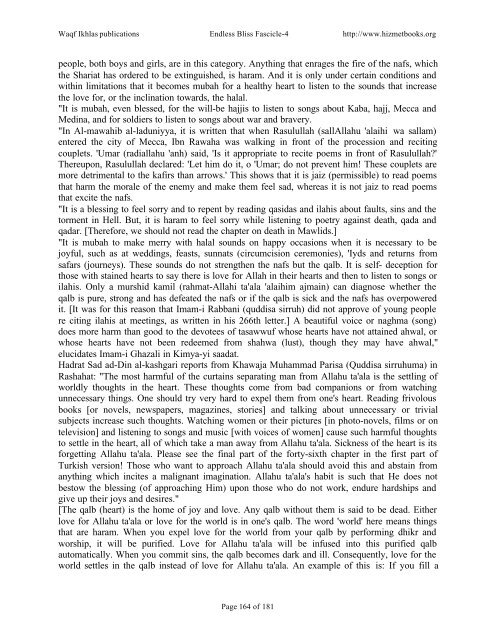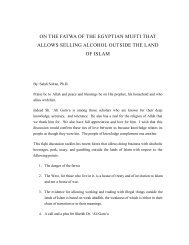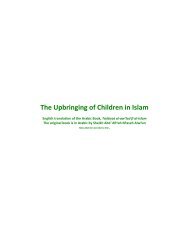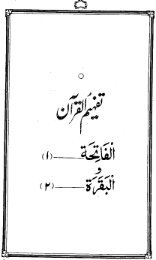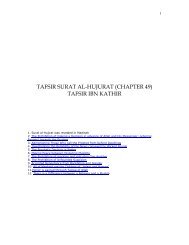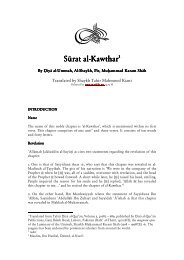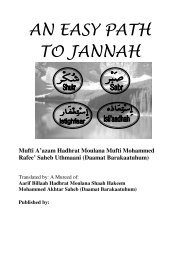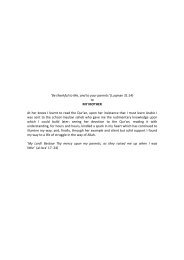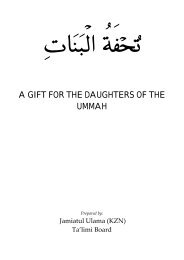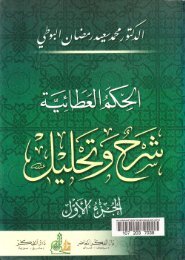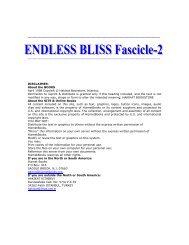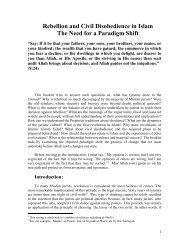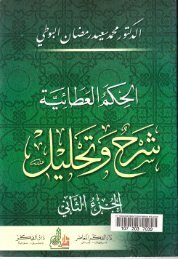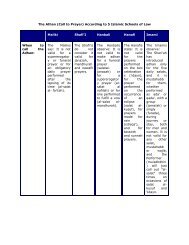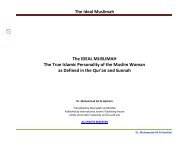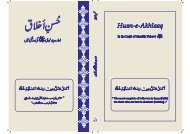ENDLESS BLISS FASCICLE-4
ENDLESS BLISS FASCICLE-4
ENDLESS BLISS FASCICLE-4
You also want an ePaper? Increase the reach of your titles
YUMPU automatically turns print PDFs into web optimized ePapers that Google loves.
Waqf Ikhlas publications Endless Bliss Fascicle-4 http://www.hizmetbooks.org<br />
people, both boys and girls, are in this category. Anything that enrages the fire of the nafs, which<br />
the Shariat has ordered to be extinguished, is haram. And it is only under certain conditions and<br />
within limitations that it becomes mubah for a healthy heart to listen to the sounds that increase<br />
the love for, or the inclination towards, the halal.<br />
"It is mubah, even blessed, for the will-be hajjis to listen to songs about Kaba, hajj, Mecca and<br />
Medina, and for soldiers to listen to songs about war and bravery.<br />
"In Al-mawahib al-laduniyya, it is written that when Rasulullah (sallAllahu 'alaihi wa sallam)<br />
entered the city of Mecca, Ibn Rawaha was walking in front of the procession and reciting<br />
couplets. 'Umar (radiallahu 'anh) said, 'Is it appropriate to recite poems in front of Rasulullah?'<br />
Thereupon, Rasulullah declared: 'Let him do it, o 'Umar; do not prevent him! These couplets are<br />
more detrimental to the kafirs than arrows.' This shows that it is jaiz (permissible) to read poems<br />
that harm the morale of the enemy and make them feel sad, whereas it is not jaiz to read poems<br />
that excite the nafs.<br />
"It is a blessing to feel sorry and to repent by reading qasidas and ilahis about faults, sins and the<br />
torment in Hell. But, it is haram to feel sorry while listening to poetry against death, qada and<br />
qadar. [Therefore, we should not read the chapter on death in Mawlids.]<br />
"It is mubah to make merry with halal sounds on happy occasions when it is necessary to be<br />
joyful, such as at weddings, feasts, sunnats (circumcision ceremonies), 'Iyds and returns from<br />
safars (journeys). These sounds do not strengthen the nafs but the qalb. It is self- deception for<br />
those with stained hearts to say there is love for Allah in their hearts and then to listen to songs or<br />
ilahis. Only a murshid kamil (rahmat-Allahi ta'ala 'alaihim ajmain) can diagnose whether the<br />
qalb is pure, strong and has defeated the nafs or if the qalb is sick and the nafs has overpowered<br />
it. [It was for this reason that Imam-i Rabbani (quddisa sirruh) did not approve of young people<br />
re citing ilahis at meetings, as written in his 266th letter.] A beautiful voice or naghma (song)<br />
does more harm than good to the devotees of tasawwuf whose hearts have not attained ahwal, or<br />
whose hearts have not been redeemed from shahwa (lust), though they may have ahwal,"<br />
elucidates Imam-i Ghazali in Kimya-yi saadat.<br />
Hadrat Sad ad-Din al-kashgari reports from Khawaja Muhammad Parisa (Quddisa sirruhuma) in<br />
Rashahat: "The most harmful of the curtains separating man from Allahu ta'ala is the settling of<br />
worldly thoughts in the heart. These thoughts come from bad companions or from watching<br />
unnecessary things. One should try very hard to expel them from one's heart. Reading frivolous<br />
books [or novels, newspapers, magazines, stories] and talking about unnecessary or trivial<br />
subjects increase such thoughts. Watching women or their pictures [in photo-novels, films or on<br />
television] and listening to songs and music [with voices of women] cause such harmful thoughts<br />
to settle in the heart, all of which take a man away from Allahu ta'ala. Sickness of the heart is its<br />
forgetting Allahu ta'ala. Please see the final part of the forty-sixth chapter in the first part of<br />
Turkish version! Those who want to approach Allahu ta'ala should avoid this and abstain from<br />
anything which incites a malignant imagination. Allahu ta'ala's habit is such that He does not<br />
bestow the blessing (of approaching Him) upon those who do not work, endure hardships and<br />
give up their joys and desires."<br />
[The qalb (heart) is the home of joy and love. Any qalb without them is said to be dead. Either<br />
love for Allahu ta'ala or love for the world is in one's qalb. The word 'world' here means things<br />
that are haram. When you expel love for the world from your qalb by performing dhikr and<br />
worship, it will be purified. Love for Allahu ta'ala will be infused into this purified qalb<br />
automatically. When you commit sins, the qalb becomes dark and ill. Consequently, love for the<br />
world settles in the qalb instead of love for Allahu ta'ala. An example of this is: If you fill a<br />
Page 164 of 181


